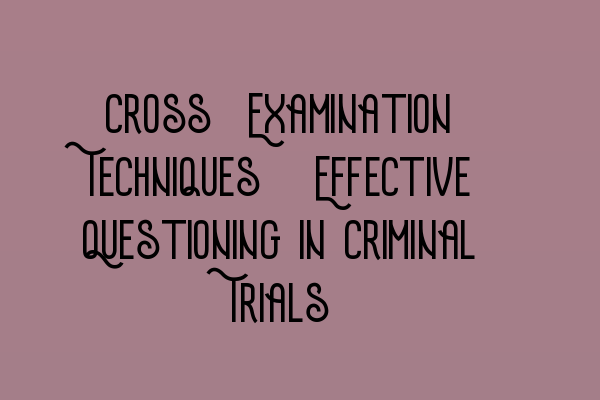Cross-Examination Techniques: Effective Questioning in Criminal Trials
Welcome to the SQE Criminal Law & Practice Law UK blog! In this article, we will explore the importance of effective cross-examination techniques in criminal trials. Cross-examination is a crucial skill for criminal law practitioners, as it allows them to challenge the credibility and reliability of witnesses while presenting their client’s case. By mastering the art of questioning, solicitors can significantly impact the outcome of a trial. Let’s dive into the key techniques that every criminal law practitioner should know!
1. Open-Ended Questions
One effective technique in cross-examination is the use of open-ended questions. Open-ended questions encourage witnesses to provide detailed and informative answers, rather than simple “yes” or “no” responses. By allowing witnesses to expand on their testimony, it becomes easier to identify inconsistencies or gaps in their account.
For example, during a criminal trial involving a theft, the solicitor may ask the witness, “Can you describe in detail what you observed at the scene of the crime?” This question allows the witness to provide a comprehensive version of events and potentially reveal inconsistencies with previous statements.
2. Leading Questions
Leading questions are another valuable technique in cross-examination. These questions steer the witness towards a desired answer, indirectly highlighting potential weaknesses in their testimony. By carefully crafting leading questions, solicitors can drive the narrative in favor of their client.
For instance, in a case where the witness claims to have seen the accused at the crime scene, the solicitor may ask, “Isn’t it true that due to poor lighting, you could not have clearly identified the person you saw?” This leading question challenges the witness’s ability to accurately identify the accused and raises doubts about their credibility.
3. Impeachment Evidence
Impeachment evidence plays a crucial role in cross-examination. It involves presenting contradictory evidence or prior statements made by the witness to challenge their credibility. By strategically using impeachment evidence, solicitors can expose inconsistencies and weaken the witness’s testimony.
For example, if a witness initially stated that they were not present at the crime scene but later contradicts themselves during cross-examination, the solicitor can present previous statements or witness testimonies proving their presence. This technique raises doubts about the witness’s reliability and casts doubt on their overall credibility.
4. Control the Narrative
An effective cross-examiner knows how to control the narrative. By being assertive yet professional, solicitors can guide the witness’s responses and prevent them from deviating from the desired line of questioning.
One way to control the narrative is through structured questioning. By organizing questions logically, solicitors can lead witnesses through a sequence of events, highlighting discrepancies along the way. This approach maintains focus and helps build a strong case.
5. Active Listening
Active listening is a crucial skill for effective cross-examination. By carefully paying attention to the witness’s responses, solicitors can identify opportunities for follow-up questions and exploit any weaknesses in their testimony.
During cross-examination, it’s essential to listen for evasive or inconsistent answers. These inconsistencies can then be challenged with further questioning or impeachment evidence. Active listening allows solicitors to adapt their strategy based on the witness’s responses and strengthen their case.
By incorporating these cross-examination techniques into their practice, criminal law practitioners can effectively challenge witnesses, expose inconsistencies, and ultimately, present a strong defense for their clients. Mastering the art of questioning is an ongoing process, and continuous practice is essential for success.
For further information on SQE exam preparation or to explore other relevant legal topics, check out our related articles and resources:
